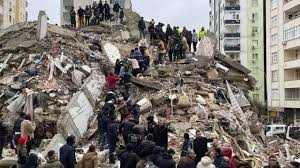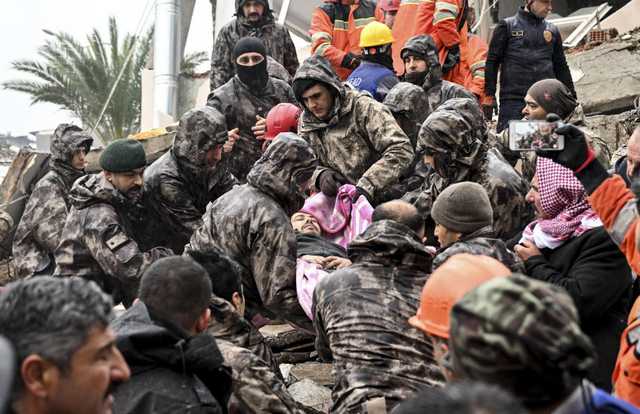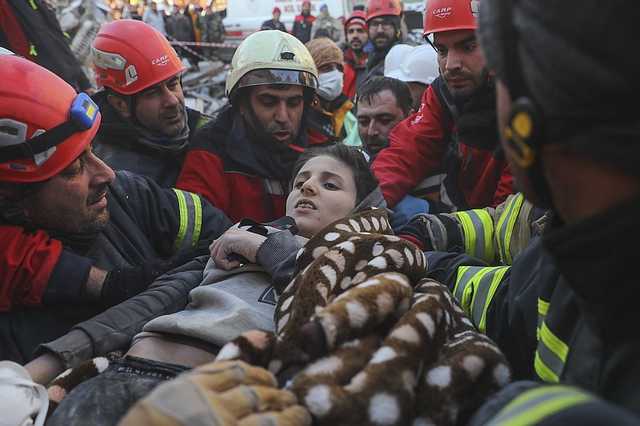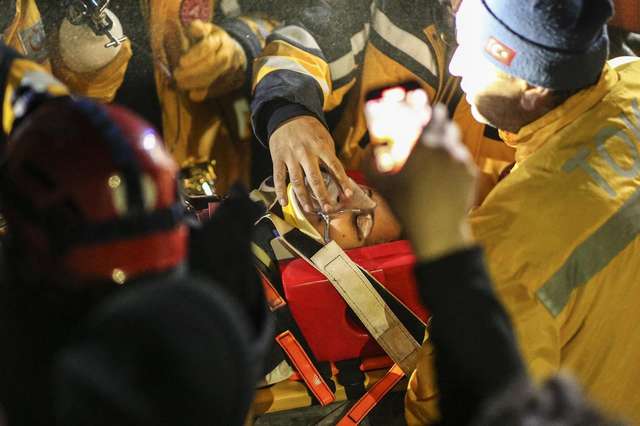
British search and rescue workers have travelled to Turkey to help look for survivors following the earthquakes that have killed over 5,000 people, both there and in neighbouring Syria. A team of 76 specialists, armed with seismic listening devices, concrete cutting and breaking equipment, four rescue dogs, and a team of emergency medics, have arrived in Gaziantep, the epicentre of the first massive quake in the early hours of Monday 6 February.
The quake measured 7.8 on the magnitude scale, making it one of the most powerful in the region in at least a century, with it being felt as far away as Cyprus and Cairo. The official number of fatalities shortly after lunchtime on 7 February stood at 3,549 in Turkey and 1,602 across the border in Syria. Over 20,000 have been injured and that obviously does not include any of the probable thousands trapped beneath the rubble of the near 6,000 buildings which have collapsed so far.
The UK’s Foreign Secretary, James Cleverly, has reported that three British nationals are believed to be amongst the missing in the area around Gaziantep, but added that the likelihood of large-scale British casualties remained low. The Turkish President Recep Tayyip Erdogan declared a three-month state of emergency in the ten provinces worst-affected, by not only the first quake and subsequent after shocks, but also the second one, which measured only slightly less at 7.5 on the magnitude scale, and had its epicentre in the Elbistan district of Kahramanmaras province, just to the north.
The British team will join an international rescue operation which is being hampered by heavy rain and snow in a race against the clock to find survivors, with the World Health Organization warning that the death toll will almost certainly dramatically rise over the coming days.
Minister pledges humanitarian aid from UK
UK Development Minister Andrew Mitchell said that the UK team of specialists would take its lead from the Turkish operation, but would add significant expertise. He also pledged to provide all necessary support, irrespective of any aid budgets pressure.
Although admitting that the budget was under considerable strain, he explained that Britain always carves out a certain amount to cope with humanitarian crises, and making the point that the country will always step up in strength when any appalling catastrophes take place. “The humanitarian budget is very carefully coordinated and set, and it reacts to the need on the ground”, he told reporters, before making the point that the first 72 hours were critical.
With regards to the Syria and the UK’s position in assisting there, he acknowledged there were difficult challenges to get resources across the border as there basically is just one crossing place, but he added that he hoped that the UN could negotiate additional crossing places in the days ahead.
PM praises first responders
Prime Minister Rishi Sunak said that the country was ready to help in “whatever way we can.” Adding that his thoughts were with the people of Turkiye (Turkey) and Syria, giving special praise to the first responders who he said were “working so valiantly to save those trapped.”
Red Cross immediately at work
Chief Executive of the British Red Cross, Mike Adamson, said it was “shocking” to see the scale of destruction caused by the earthquakes with homes, hospitals and roads destroyed across the region, and confirmed that Red Cross Red Crescent teams were “on the ground in Syria and Turkey providing urgent support during these critical hours.”
Medical charity to assess greatest needs
David Wightwick, CEO of medical aid charity UK-Med, also confirmed that he and his team were on their way to Turkey to assess where their help is most needed, before mobilising their register of hundreds of NHS medics to the areas they identify.
British Turks in anguished calls
The chairman of the British Turkish Association, Attila Ustun described it as an absolutely “heartbreaking” situation and that they were “inundated” with calls from people worried sick about loved ones.
He reported that one lady from London had been in touch overcome with grief after learning that half of her village had been reduced to rubble. He said that the Association is taking donations, particularly winter clothes, at different points across the UK to send out to the devastated region.
Frightening numbers
The World Health Organization’s senior emergency officer for Europe, Catherine Smallwood, believes that the death toll could rise to well over 20,000, plus she said that literally millions will be affected, probably over 20 million, in some form or another.
President Erdoğan described the events as the worst disaster for the country since 1939, when an earthquake killed over 32,000 people, and injured more than 100,000.
Ukraine admirably offer support
Among the countries offering support are war-torn Ukraine, this despite the imminent likelihood of a further military onslaught from the Russians. Kyiv’s foreign minister Dmytro Kuleba said his country was ready to send rescue workers to the affected areas and help all it could. Also declaring their willingness to assist is Turkey’s long-term rival Greece, who have already dispatched both rescuers and doctors.
Ghana footballer pulled from the rubble
One of those lucky ones to be pulled from the rubble is Ghanaian international footballer Christian Atsu. The 31-year-old forward formally of Newcastle, Chelsea, Everton, and Bournemouth is now a Hatayspor player in the Turkish Süper Lig. Hatay is right next to the epicentre and as such felt the force of the earthquake.
He is thought to have suffered injuries, although as yet the severity of which are unknown. What is known is that his team’s sporting director, Taner Savut, is still unaccounted for under a collapsed building. The player only joined in September 2022 after a season with Saudi Arabian team Al-Raed. He actually scored the winning goal in the 90th minute of Hatayspor’s match on Sunday, less than 24 hours earlier.
Jihadists make their escape
There are reports that the quake damaged a prison in the town of Rajo near the Turkish border which held approximately 2,000 inmates, of which some 1,300 of them were IS fighters, and Kurdish-led forces. It is believed around 20 Syrian jihadists managed to escape as a result.
Many fast asleep as quake strikes
On top of the quake being of such a high classification, part of the reason why this one seems to have been so deadly is its timing. It occurred in the early hours of the morning with the vast majority of people sleeping.
The infrastructure in Southern Turkey is also not of great quality, meaning the sturdiness of the buildings was questionable. This quake was caused by the Arabian tectonic plate moving northwards and grinding against the Anatolian plate, at a depth of just 6 miles or so below the surface, which in earthquake terms is extremely shallow and these cause far more damage, due to more incredibly powerful energy being released.
Why not Richter measurement?
They used to be measured by what was referred to as the Richter Scale, but this is now considered outdated and far less accurate. They are now measured on a scale called the Moment Magnitude Scale and the number attributed to an earthquake represents a combination of the distance the fault line has moved, and the force with which it was moved.
Not an eight but definitely a catastrophe
A tremor of 7.8 which is what has happened in Turkey and Syria, is regarded as major and will usually causes serious damage, as it has clearly been the case; although the official line is that it takes anything given a score of above 8 to be categorized as likely to cause catastrophic damage and totally destroy communities.
The survivors of the devastation caused yesterday, which spreads across areas the size of small countries, would point to a massive miscalculation and a necessity to re-write such a statement.





0 Comments